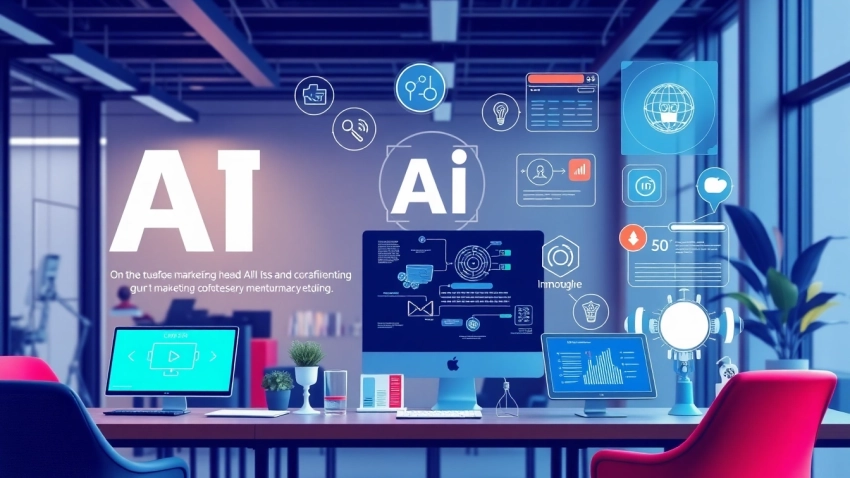
Maximize Your Business Impact with the Best AI Marketing Tools of 2025
Introduction to AI Marketing Tools
As businesses continue to embrace technology, AI marketing tools have emerged as essential instruments in developing competitive marketing strategies. These tools leverage artificial intelligence (AI) and machine learning to streamline marketing processes, enhance productivity, and deliver personalized customer experiences at scale. In an era where data-driven decisions are paramount, understanding AI marketing tools can set the foundation for accelerated growth and improved performance across various marketing channels.
What Are AI Marketing Tools?
AI marketing tools refer to applications that incorporate artificial intelligence to enhance marketing initiatives. They help automate some tasks traditionally executed by human marketers, such as market analysis, content creation, customer targeting, and performance tracking. The evolution of these tools has allowed businesses to harness large datasets and predictive analytics, enabling efficient decision-making and strategy adjustments based on real-time insights.
Benefits of AI in Marketing
The integration of AI into marketing offers numerous advantages:
- Improved Efficiency: By automating repetitive tasks like data gathering and analysis, marketers can focus on strategic initiatives and creativity.
- Enhanced Targeting: AI algorithms analyze customer behaviors, preferences, and trends, allowing businesses to deliver personalized content and improve user engagement.
- Cost Savings: Streamlining processes often results in reduced labor costs and more effective budget allocation.
- Data-Driven Insights: AI tools provide actionable insights that can guide future marketing campaigns and improve ROI.
- Real-Time Adaptation: AI can adjust strategies on the fly, enabling businesses to respond quickly to market changes and customer feedback.
Overview of Popular Tools
Several leading AI marketing tools have gained popularity due to their effectiveness in helping businesses streamline various marketing processes. Some of the most noteworthy include:
- HubSpot: This platform uses AI for customer relationship management (CRM), inbound marketing, and lead generation, making it a favorite among marketers.
- Canva: With built-in AI functionalities, Canva simplifies graphic design, allowing marketers to create visually appealing materials without extensive design skills.
- SEMrush: This all-in-one tool provides powerful insights into SEO, content marketing, and competitor analysis through AI-driven technologies.
- Jasper: A cutting-edge content creation platform that generates high-quality written content based on user inputs.
- FeedHive: Ideal for social media management, this tool streamlines content recycling and conditional posting.
Types of AI Marketing Tools
Content Creation and Automation
Content marketing remains a cornerstone of many marketing strategies, and AI tools have revolutionized this aspect through:
- Automated Content Generation: Tools like Jasper generate articles, social media posts, and product descriptions based on defined keywords and topics, significantly reducing time spent on content creation.
- Content Optimization: Platforms like Surfer SEO analyze existing content and provide recommendations to enhance SEO, ensuring that content reaches a broader audience.
- Dynamic Content Personalization: AI can help marketers personalize website content and emails based on user behavior, increasing engagement rates.
Customer Relationship Management (CRM)
AI-powered CRM systems enhance customer interactions by automating data capture, providing actionable insights, and supporting personalized communications. Key functionalities include:
- Predictive Analytics: AI analyzes historical customer interactions to predict future behaviors and preferences, allowing proactive marketing strategies.
- Segmentation: AI tools segment audiences more effectively by analyzing data points faster and more accurately, enabling tailored messaging.
- Chatbots: Implementing AI chatbots on websites provides instant customer service and support, increasing customer satisfaction and reducing bounce rates.
Social Media Management Tools
Social media is a critical marketing channel, and AI tools assist in managing and optimizing campaigns. These tools offer:
- Content Scheduling: Tools like Buffer and Hootsuite help plan and schedule posts across multiple channels, ensuring consistent branding and messaging.
- Performance Analysis: AI monitors social media engagements and metrics, providing insights into customer sentiment and campaign effectiveness.
- Audience Engagement: AI tools analyze user behaviors to recommend optimal posting times and targeted content, enhancing the reach and impact of social media campaigns.
How to Choose the Right AI Marketing Tool
Assessing Business Needs
Before investing in AI marketing tools, businesses must assess their unique requirements. Considerations include:
- Business Size: Smaller companies may prioritize budget-friendly solutions, while larger enterprises might require comprehensive systems to meet complex demands.
- Marketing Goals: Define specific goals such as lead generation, brand awareness, or customer retention to identify tools that align with these objectives.
- Integration Capabilities: Ensure that any chosen tool seamlessly integrates with existing platforms and technology stacks.
Budget Considerations
Understanding the budget is vital for selecting AI marketing tools. Key points to consider include:
- License Fees: Evaluate whether tools charge a one-time fee or require subscription payments.
- Return on Investment (ROI): Analyze potential benefits and cost savings to justify expenditures on AI marketing tools.
- Free Trials and Demos: Take advantage of free trials or demos to test tools before committing to a purchase.
Scalability and Integration
Selecting AI marketing tools that are scalable ensures they can grow alongside your business. Consider:
- Flexible Pricing Models: Look for tools that offer tiered pricing to accommodate growth without necessitating a complete vendor change.
- Integration with Existing Software: Confirm that new tools can work with existing systems such as CRMs or e-commerce platforms.
- Feature Richness: Choose tools that offer a suite of features to anticipate future needs without incurring additional costs.
Case Studies: Success with AI Marketing Tools
Case Study 1: E-commerce Growth
A leading e-commerce company implemented AI marketing tools to enhance its online presence. The results were remarkable:
- Increased Conversion Rates: By using AI-driven algorithms for personalized recommendations, the company saw a 30% increase in average order value.
- Improved Customer Retention: Automated email campaigns with personalized product suggestions led to a 25% increase in repeat customer purchases.
- Efficient Inventory Management: Predictive analytics helped optimize stock levels, reducing holding costs by 20%.
Case Study 2: Enhanced Customer Insights
A travel agency adopted AI tools to analyze customer preferences and behaviors, leading to significant advancements:
- Better Understanding of Customer Preferences: Insights derived from customer data helped the agency tailor marketing campaigns, leading to a 35% increase in engagement.
- Targeted Campaigns: Specialized promotions based on user data resulted in a 40% rise in bookings during the off-peak season.
- Data-Driven Decision Making: Enhanced analytical capabilities allowed the agency to pivot quickly based on trends and customer feedback.
Case Study 3: Streamlined Marketing Processes
A small business implemented AI-driven marketing automation tools, resulting in streamlined processes:
- Labor Reduction: Automating routine tasks saved the team over 20 hours per month.
- Accessibility of Analytics: AI tools provided real-time insights, meaning the team could make informed decisions swiftly.
- Greater Focus on Strategy: With that time saved, the marketing team could concentrate on building a more strategic and creative approach.
Future Trends in AI Marketing Tools
Emerging Technologies
The marketing landscape continues to evolve with emerging technologies enhancing AI capabilities, including:
- Voice Search Optimization: As voice search becomes more prevalent, tools will likely focus on optimizing content for voice queries.
- Emotion Recognition: AI tools may develop better capabilities to analyze customer emotions through interactions, enhancing personalization strategies.
- AI in Video Marketing: The integration of AI in video content creation automates engagement analysis, enabling more targeted video marketing campaigns.
Predictions for 2026 and Beyond
Looking forward, we can expect several trends in AI marketing:
- Increased Use of Augmented Reality (AR): AR combined with AI will help provide immersive marketing experiences.
- Hyper-Personalization: Marketers will leverage AI to develop messages that adapt in real-time based on user interactions.
- Decentralized Marketing Solutions: As privacy concerns rise, decentralized AI tools may gain popularity, empowering users to control their data.
Preparing for Changes in Marketing Strategy
Businesses should prepare for changes in marketing strategies driven by AI developments:
- Continuous Learning: Marketers must stay informed about emerging AI trends and updates to existing tools.
- Invest in Training: Businesses should invest in upskilling teams to utilize AI tools effectively and maximize their benefits.
- Experimentation with AI: Organizations should foster a culture of experimentation, encouraging teams to try new AI tools and strategies to discover innovative marketing solutions.












Leave a Reply